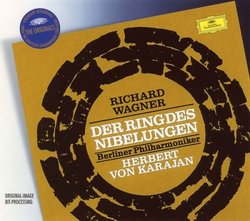Ghastly Expensive Thing of Value
Joseph L. Ponessa | Glendive MT USA | 01/05/2009
(5 out of 5 stars)
"In the midst of this worldwide financial crisis, the Japanese are rolling out a variety of quasi-audiophile improvements to the Red Book CD format. HQCD uses a different kind of metallic backing; SHM uses a different kind of plastic for the physical disc. These are limited releases at astronomical prices, but the specs do not rise to the level of SACD, DVD-Audio or Blu-Ray HD audio formats.
Because of the price I should not have ordered this Karajan Ring set but it happened to appear when I was gathering recordings of the Ring to prepare for the live experience at the Seattle Opera in August 2009. My experience with the Ring was previously limited to video releases (Boulez, Sawallisch, Barenboim, Bareza and Levine on laserdisc; de Billy, Zagrosek and Haenchen on DVD), and a live Ring cycle in Seattle back in 1991. I had never heard any of the audio-only recordings.
With a newly arrived batch of 1950's live recordings imported from Germany on MP3 discs at amazingly low prices, and another new batch of later studio recordings, I set about to compare Karajan's SHM set with all of the others. It was not easy doing an A/B comparison because it was hard to stop the SHM discs. The music thrusts forwards carrying the listener along into the music. The Solti, by contrast, seems to proceed in fits and starts, belying a cut-and-paste approach to sound editing. The 1950's recordings showcase great artists, but the sonic limitations are great, except in the live stereo recording of Keilberth at Bayreuth in 1955 which was done with the highest professionality.
Finally I settled upon a particular passage, easy to locate in any collection, the opening tremulos of the Vorspiel of Die Walküre. Many recordings are a muddled mass of sound here. The Berlin strings under Karajan come across as highly precision instruments in the SHM pressing, and no other recording rises to that level, not Vienna under Solti, not Munich under Sawalisch, not Bayreuth in any of the many recordings.
The last time I was in Berlin, I had an hour to spend waiting at the trackside in the Ostbahnhof. Trains came and went, and I noticed that just before the top of the hour the trains waited patiently and precisely as the clock struck they rolled out to their various destinations. I had the experience of being at the heart of a vast mechanical clock, comprising the entire German railway system, and that all the proceedings were like a symphony of synchronized motion. Under Karajan the Berlin players make the Ring function like clockwork, and after hearing them I cannot appreciate the other recordings any more than I would have a mystical experience of railway synchronicity in Chicago's Union Station or Paris's Gare du nord or Rome's Stazione termini. In a great symphonic opera cycle like the Ring, the best thing a conductor can do is give the singers a clear and faithful orchestral underpinning. Karajan does this for his singers, and the SHM discs let you hear him do it. If you love the Ring and can afford the SHM disc, don't delay to get this limited pressing while it is still available."

